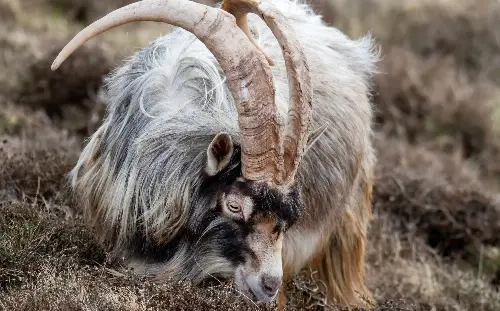
Scottish Parliament ministers are considering new protections for native wild goats after a private landowner carried out a cull.
Oxygen Conservation, a company that owns 11,000 acres of moorland in the Scottish Borders, faced criticism for the killing of feral goats around the villages of Langholm and Newcastleton.
The animals’ ancient bloodline can be traced back 3,000 years to native species that roamed during the Iron Age but Oxygen claims the 138-strong herd needs to be reduced to protect trees and prevent a “serious threat to delicate habitats”.
Residents argued that the culling of the goats, which have no legal protection, took place during the “kidding” season, when female goats give birth. Oxygen said culling had been paused until later this year.
A petition for the goats to be given protected status to ensure their survival is now under consideration by MSPs.
Lodged with the Scottish Parliament last month, the petition states: “These neglected species survive in the last truly wild and free habitats of the Borders, and represent an independence of spirit reflective of our national character. Their numbers are dangerously low, and in danger of extinction due to loss of habitat, and systematic and ongoing culling.”
The feral goats of the Cheviots in Northumberland, which share similarities with the native goats in Scotland, have been added to a watchlist by the Rare Breeds Survival Trust, a conservation charity. They are also included on a native breeds at risk list maintained by the Department for Environment, Food and Rural Affairs.
However, the Scottish goat population has limited protection under the Nature Conservation (Scotland) Act 2004.
Last month, Oxygen Conservation, which has bought several rural estates across the UK in its bid to “deliver positive environment and social impacts”, said it planned to reduce the number of wild goats in an area of Langholm Moor known as Blackburn and Hartsgarth.
The firm, which bought the land at the end of 2023, said the wild goat population had exploded from 20 to 138 at the last count in January.
David Braithwaite, a Newcastleton resident and conservationist, said the animals were not prolific breeders and that it was far more likely that more of the nomadic goats had strayed onto Oxygen’s land at the last count.
Thousands of locals in Newcastleton, Langholm and surrounding areas signed a petition against culling the goats. The practice is legal providing that animal welfare guidelines are followed.
Mr Braithwaite said Oxygen confirmed in an email that a cull, focusing on male goats, was under way and that meat from the goats had been sold into the food chain.
He added: “It’s great news that the petition is under consideration but we need Scottish ministers to take this seriously. There needs to be a long-term conservation strategy and statutory protection for the goats, which are truly loved.
“I think that someone should call “time out” on this so that things can be properly reviewed. None of this is making any sense and I would have expected the government agency to have worked out that the conservation priority for this highly protected landscape is assisted by the wild goats.”
Cull to continue later this year
David Mundell, the MP for Dumfriesshire, raised his concerns to Lucy Powell, the Leader of the Commons, as fears grew about the future of the goat herd in an integral part of their scenic natural home landscape.
Mr Mundell asked: “Whatever the merits or otherwise of such a scheme, does the Leader of the House agree that it is important that organisations such as Oxygen [Conservation] consult local people and do not just ride roughshod over their views”?
Oxygen Conservation said a targeted reduction, using trained professional shooters, will be conducted over the course of the year to reduce the number back to the original population of 20, avoiding times when nannies are heavily pregnant or with young kids.
A spokesperson added: “We have stopped culling now, but will continue later in the year.
“We can confirm that the meat from the cull will be legally entering the Scottish human and animal food chains through licensed game dealers, they have asked to not be mentioned. Importantly, Oxygen Conservation has not received a penny from this process.”
NatureScot said a licence was not required to cull wild goats as they were not considered a native species and therefore had no legal protection.
A spokesperson added: “We understand why the community is concerned about the goats at Langholm, but as goats aren’t a protected species, culling them is legal as long as animal welfare guidelines are followed.”